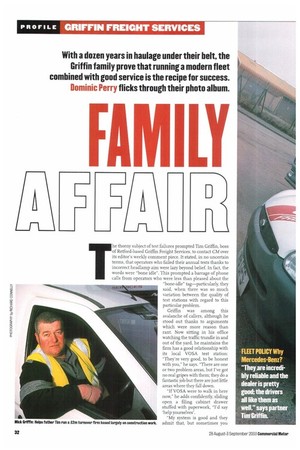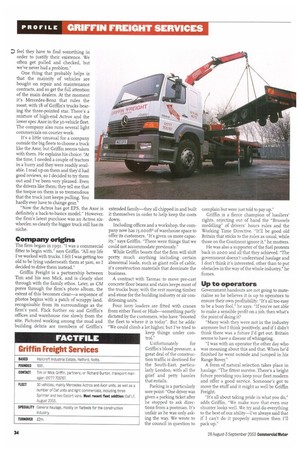FA
Page 32

Page 34

If you've noticed an error in this article please click here to report it so we can fix it.
The thorny subject of test failures prompted Tim Griffin, boss of Retford-based Griffin Freight Services, to contact CM over its editor's weekly comment piece. It stated, in no uncertain terms, that operators who failed their annual tests thanks to incorrect headlamp aim were lazy beyond belief. In fact, the words were "bone idle". This prompted a barrage of phone calls from operators who were less than pleased about the
"bone-idle" tag—particularly, they said, when there was so much variation between the quality of test stations with regard to this particular problem.
Griffin was among this avalanche of callers, although he stood out thanks to arguments which were more reason than rant. Now sitting in his office watching the traffic trundle in and out of the yard, he maintains the firm has a good relationship with its local VOSA test station: "They're very good, to be honest with you," he says. "There are one or two problem areas, but I've got no real gripes with them; they do a fantastic job but there are just little areas where they fall down.
"If VOSA were to walk in here now," he adds confidently, sliding open a filing cabinet drawer stuffed with paperwork, "I'd say 'help yourselves'.
III "My system is good and they Mick Griffin: Helps father Tim run a £2m turnover firm based largely on construction work, admit that, but sometimes you
feel they have to find something in order to justify their existence. We often get pulled and checked, but we've never had a problem."
One thing that probably helps is that the majority of vehicles are bought on repair and maintenance contracts, and so get the full attention of the main dealers. At the moment it's Mercedes-Benz that rules the roost, with 18 of Griffin's trucks bearing the three-pointed star. There's a mixture of high-end Actros and the lower spec Axor in the 30-vehicle fleet. The company also runs several light commercials on courier work.
It's a little unusual for a company outside the big fleets to choose a truck like the Axor, but Griffin seems taken with them. He explains his choice: "At the time, I needed a couple of tractors in a hurry and they were readily available. I read up on them and they'd had good reviews, so I decided to try them out and I've been very pleased. Even the drivers like them; they tell me that the torque on them is so tremendous that the truck just keeps pulling. You hardly ever have to change gear."
"Now the Actros has got EPS, the Axor is definitely a back-to-basics model." However, the firm's latest purchase was an Actros sixwheeler, so dearly the bigger truck still has its niche.
Company origins
The firm began in 1991. "I was a commercial fitter to begin with," says Griffin. All my life I've worked with trucks. I felt I was getting too old to be lying underneath them at 3am, so I decided to drive them instead."
Griffin Freight is a partnership between Tim and his son Mick, and is clearly shot through with the family ethos. Later, as CM pores through the firm's photo album, the extent of this becomes clear—a sequence of photos begins with a patch of scrappy land, recognisable from its surroundings as the firm's yard. Flick further on and Griffin's offices and warehouse rise slowly from the site. Pictured working among the mud and building debris are members of Griffin's
extended family—they all chipped in and built it themselves in order to help keep the costs down.
Including offices and a workshop, the company now has 15,000ft2 of warehouse space to offer its customers. "It's given us more capacity," says Griffin. "There were things that we could not accommodate previously."
While Griffin boasts that the firm will shift pretty much anything including certain abnormal loads, such as giant rolls of cable, it's construction materials that dominate the business.
A contract with Tarmac to move pre-cast concrete floor beams and stairs keeps most of the trucks busy, with the rest moving timber and stone for the building industry or air conditioning units.
Four lorry loaders are fitted with cranes from either Fassi or Hiab—something partly dictated by the customers, who have "boosted the fleet to where it is today". But he adds: "We could climb a lot higher, but I've tried to keep things under control."
Unfortunately for Griffin's blood pressure, a great deal of the construction traffic is destined for the South-East, particularly London, with all the grief and petty hassles that entails.
Parking is a particularly sore point: "One driver was given a parking ticket after he stopped to ask directions from a postman. It's unfair as he was only asking the way. We wrote to the council in question to complain but were just told to pay up."
Griffin is a fierce champion of hauliers' rights, rejecting out of hand the "Brussels meddling" of drivers' hours rules and the Working Time Directive. "It'll be good old Britain that sticks to the rules as usual, while those on the Continent ignore it," he mutters.
He was also a supporter of the fuel protests back in 2000 and all that they achieved. "The government doesn't understand haulage and I don't think it's interested, other than to put obstacles in the way of the whole industry," he fumes.
Up to operators
Government handouts are not going to materialise so he believes it is up to operators to ensure their own profitability; "It's all too easy to be a busy fool," he says. "If you're not able to make a sensible profit on a job, then what's the point of doing it?
"Many wish they were not in the industry anymore but I think positively, and if I didn't think there was a future I'd get out. Britain seems to have a disease of whingeing.
"I was with an operator the other day who was moaning about this and that. When he'd finished he went outside and jumped in his Range Rover."
A form of natural selection takes place in haulage. "The fittest survive. There's a bright future providing you keep your fleet modern and offer a good service. Someone's got to move the stuff and it might as well be Griffin Freight.
"It's all about taking pride in what you do," adds Griffin, "We make sure that even our shunter looks well. We try and do everything to the best of our ability—I've always said that if I can't do it properly anymore then I'll pack up."




































































































































































